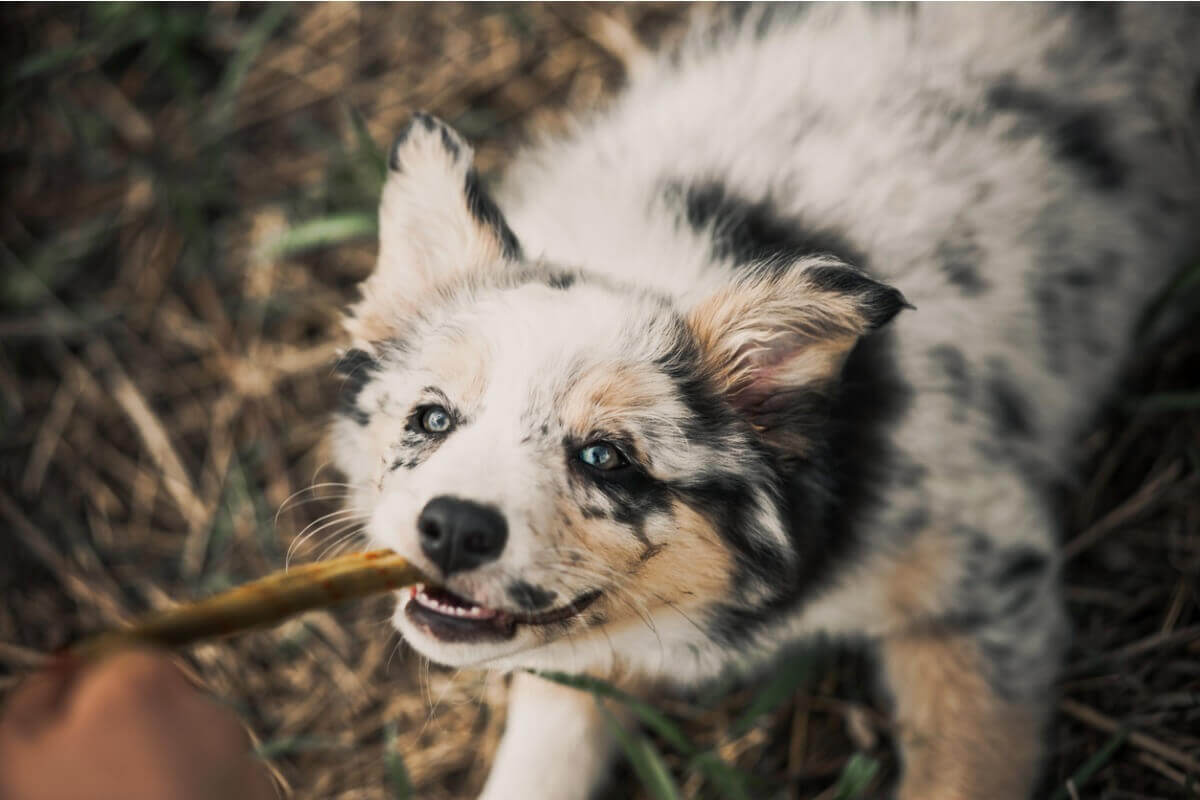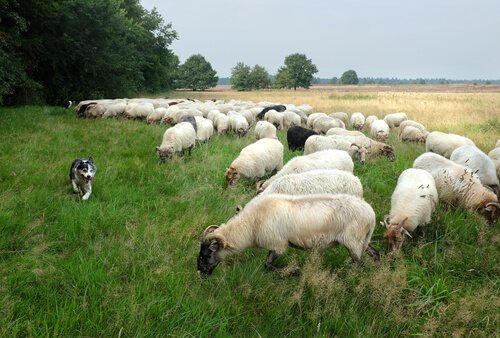The Carea Leonés: Everything About This Breed


Reviewed and approved by the biologist Samuel Sanchez
The Carea Leonés isn’t a popular dog, as it’s not a well-known dog as a pet. His great talent is that of a shepherd dog, a function that it performs perfectly. Therefore, it’s used to living in very large places that allow it to move about freely.
It’s for this reason that a small house isn’t the best place for this dog, and for this reason, its fame isn’t very widespread. Even so, it’s an animal that has many qualities that are worth knowing, especially for those owners who have farms or houses with gardens. Do you want to know more about them?
The origin of the Carea Leonés
Centuries ago, a search began in the northern regions of Castilla y León (Spain) for a perfect sheepdog to accompany transhumance. Experts don’t know which dogs were involved in its emergence, but the reality is that a breeder invested more than 30 years in establishing the standard of the Carea Leonés.
This is how this person managed to find an agile, energetic, intelligent animal and an excellent driver of sheep. Despite not being well known outside the Spanish borders, this dog has spread within the country.
Contrary to what happened with the disappearance of many breeds during history’s great tragedies, the Spanish Civil War didn’t affect the population of the Carea Leonés. Furthermore, the number of specimens increased during those years, as they participated in activities other than grazing. Even so, it wasn’t until 2018 when its official standard was recognized by the Royal Canine Society of Spain.

Characteristics of the Carea Leonés
The Carea Leonés, or Canis lupus familiarise, is a medium-sized dog. Males are 19-22 inches at the withers (18-20.5 centimeters in females) and both sexes have a well-proportioned and muscular body.
These animals have strong and long limbs, ideal for grazing activities. As for its head, the species has an elongated muzzle, large ears that are normally lowered, and deep eyes.
Another very prominent feature of this dog is its coat. It consists of a double layer of harlequin colors, which means that it combines a black tone with gray and white spots. Thanks to the whitish background, this canine bears a pattern similar to that of marble or granite on its body.
In addition, this breed can also have tan spots on the legs, face, and above the eyebrows, all without an established pattern. The hair is soft and doesn’t require great care for its maintenance (beyond what’s normal).
Carea Leonés temperament
This dog is very brave and territorial, perfect characteristics when it comes to protecting livestock. In addition, it’s a very active, intelligent, and loyal dog as far as its work is concerned, as well as with the main person who takes care of it.
However, affection and attention aren’t its strong suit, which is why it’s not usually chosen as a pet. This dog’s very used to the country environment and to living with a certain degree of freedom. Therefore, it doesn’t tend to become very attached to people.
Faced with unknown humans, it’s quite suspicious and can bring out its protective instinct with some aggressiveness if it hasn’t been properly socialized. Hence, despite not being the best dog as a companion animal, it must go through a correct period of socialization like any other dog.
Carea Leonés care
One of the main care aspects to take into account when it comes to the Carea Leonés is its diet. As it’s a very energetic dog that must perform a lot of daily physical activity, its diet must be of good quality, balanced, and with the right amount of specific nutrients for its wear and tear.
The calories have to be established in advance and supervised because only in this way will excess weight or malnutrition be avoided. At mealtime, this dog can sometimes become anxious, so its portions will have to be divided if this happens in order to avoid gastric torsion.
If you choose to have a Carea Leonés, another one of the most specific care requirements of the breed is to think in advance where it should live. As mentioned, it requires an open site in which to perform many games and exercises.
For this reason, it’s not usual for this dog to live in urban places, where it’s more difficult to give it all the stimulation it needs. Even so, this animal could get used to the city as long as it lives there from the time it’s a puppy and walks and runs every day for hours in open spaces.
Mental stimulation is also essential for this dog, especially if it’s not tending a herd. There are specific intelligence games for dogs that can help the Carea Leonés in this regard, but it’s always a better option to have a professional guide you on this topic.
Hygiene of the Carea Leonés
The Carea Leonés isn’t an animal that requires frequent baths, so once every month and a half will suffice. At the same time, their coat doesn’t require great attention due to its characteristics, although it’s always a good idea to brush it once a week to remove dead hair.
As for the other care requirements related to the hygiene of this dog, it’s important to note that they don’t differ from the rest of the breeds. Checking their nails and trimming them if they’re very long, cleaning their ears to avoid wax accumulation, and brushing their teeth to prevent the accumulation of tartar and the appearance of oral diseases are the most important.
Training of the Carea Leonés
Being a guardian, the Carea Leonés is very loyal and obedient towards the person it considers its main guide. For this reason, it’s essential that the same human always gives it orders, invests time in its education, and helps them socialize.
Socialization must when the animal’s a puppy and the dog will have to face different situations and share time with different people and animals. This way, negative behaviors will be avoided in the future, such as fear or aggressiveness in the face of strangers.
By nature, Carea Leonés are highly intelligent and fast learner dogs. Even so, you should always dedicate the necessary time to their training, as well as positive reinforcement for their education.
Carea Leonés health
This dog is a strong animal that’s become accustomed to life abroad and in which hereditary diseases aren’t recognized. However, due to its size and its fairly rapid growth, it can suffer from diseases such as hip or elbow dysplasia.
These conditions cause great pain in the animal, as well as difficulty in walking, which could prevent it from carrying out its herding activities, in addition to reducing its quality of life. Check-ups and veterinary attention are essential in order to detect these or other problems.
In addition, the vaccination and deworming of this dog must always be up to date. This is important in all cases, but in that of the Carea Leonés, it’s more evident, as it’s an animal that spends most of its time outdoors, exposed to different pathogens.
The Carea Leonés as a pet
As a working dog, the Carea Leonés is excellent, but as a pet, it’s not usually very successful. These animals aren’t a good fit for families with children because of their emotional traits and they don’t do well in homes with other pets or with people with a very sedentary lifestyle.
The owner of this dog must show strong leadership traits, as this animal will obey you without thinking. If the caregiver isn’t confident, they could have different behavior problems, although their shepherding instincts will still naturally remain.

Thinking about which dog could be a good shepherd for your cattle? The Carea Leonés is undoubtedly a great option. If you provide them with the care they need, you can enjoy their services and affection for 12-14 years.
All cited sources were thoroughly reviewed by our team to ensure their quality, reliability, currency, and validity. The bibliography of this article was considered reliable and of academic or scientific accuracy.
- Perro Leonés de Pastor. Recogido el 7 de septiembre en https://www.rsce.es/es/index.php?option=com_content&view=article&id=1392
- Perro leonés. Recogido el 7 de septiembre en https://es.wikipedia.org/wiki/Pastor_leon%C3%A9s
- Razas españolas. Recogido el 7 de septiembre en https://www.rsce.es/es/razas-espa%C3%B1olas.html
- Carea leonés. Recogido el 7 de septiembre en https://www.caninacostadelsol.es/razas/grupos-%C3%A9tnicos-caninos/carea-leon%C3%A9s/
This text is provided for informational purposes only and does not replace consultation with a professional. If in doubt, consult your specialist.